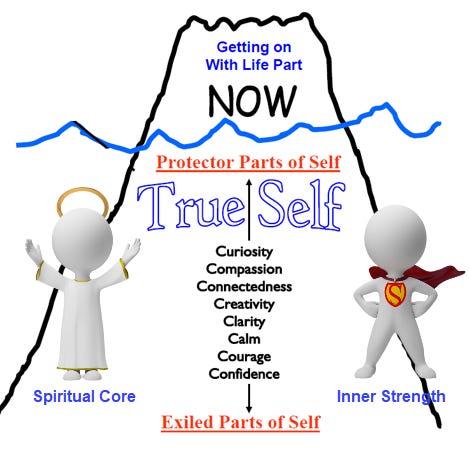Children Can't Fight & They Can't Escape; So They Become POWs
How Parts Work & IFS Heal Childhood Wounds & Find Freedom
Sometimes the most protective parts of us were born in the most powerless moments of our lives. September is Recovery Month and that means we are going to join others all over the nation to promote recovery. The following offer of 90% off on Thawing Childhood Abandonment Issues eBook at Amazon.Com is one of our many contributions to Recovery. Watch the brief video below to learn more!
💭 Imagine a child in a home where fighting, chaos, or neglect is the norm. The child can’t fight back against adults. They can’t run away. They’re trapped — a Prisoner of War (POW) in their own home.
👉 And yet, their mind finds ways to survive. Protector Parts step forward like resourceful fellow prisoners:
Managers keep the child compliant, quiet, or invisible.
Firefighters leap into action to numb the pain with food, fantasy, substances, or rage.
Exiles — the wounded inner children — are pushed deep down, carrying unbearable loneliness, shame, or fear.
These strategies are brilliant in the moment. They help the child survive. But in adulthood, they can become prisons of their own — keeping us stuck in patterns that no longer serve us.
🧩 Fictitious Examples of Protector Parts
The Invisible POW Samantha grew up with a volatile father. Her Manager part decided the safest strategy was to never be noticed. She became the “good girl,” quiet, straight-A student, never asking for help. As an adult, she still feels invisible at work, rarely speaking up, even when she has valuable insights.
The Firefighter Escape Artist Marcus’s childhood was marked by constant criticism. His Firefighter discovered that video games and later alcohol could transport him out of the battlefield of shame. Now, when stress builds, his first impulse is escape — though he longs for healthier ways to cope.
The Exile in Solitary Angela’s mother abandoned the family when she was 6. Her Exile part carried the unbearable grief and belief, “I’m not worth staying for.” To keep that pain at bay, protectors walled off this tender part like a prisoner in solitary confinement. As an adult, intimacy terrifies her — because closeness threatens to unlock that cell.
🧠 Internal Family Systems (IFS) teaches that these parts aren’t our enemies. They’re heroes who adapted under impossible circumstances. Healing begins not by tearing down the prison walls with force, but by befriending the protectors and giving the exiles what they always needed: compassion, safety, and connection. Inner Family Systems Therapy (IFS) offers tools for these purposes. Below these IFS tools are integrated with my R.A.D.I.C.A.L Reintegration Protocols.
✨ The 8C’s of True-Self Energy (IFS)
🔑 The Eight C’s inform us that we are in our True-Self Energy. This means we can be there WITH our Parts and FOR our Parts. Practice noticing how you FEEL TOWARD the Part you are working with. If you feel something other than these qualities, we are likely to be blended with a conflicting Part of self.
Calm – Grounded, relaxed presence
Curiosity – Gentle interest without judgment
Clarity – Clear, focused thinking
Compassion – Kindness toward self and others
Confidence – Trust in your own wisdom
Courage – Willingness to face difficulty
Creativity – Openness to new solutions
Connectedness – Feeling in relationship with others and self
✨The 6 F’s of Working with Parts (IFS)
🔑The Six F’s outlined below provide us with a roadmap for developing Self-Leadership. When we follow this roadmap we are building a healthy relationship with our parts and getting into a position to help wounded Parts heal, while teaching Protecting Parts a new job.
Find – Notice a part (usually begins with a feeling or thought)
Focus – Turn your attention inward to explore that part
Flesh Out – Learn about the part’s emotions, role, appearance, history
Feel Toward – Check how you feel toward the part at every stage (8 C’s)
BeFriend – Build a trusting relationship with the part
Fear – Discover what fear the part holds that keeps it from changing
🔑 Freedom doesn’t come from fighting our parts, but from Self-leadership — when the core Self (calm, curious, compassionate) steps forward and leads the system like a wise liberator. Below R.A.D.I.CAL Reintegration is blended with the 6 Fs & 8 Cs.
✨ R.A.D.I.C.A.L, The Six Fs, & The 8 Cs
R: Recognize Reactivity → Find & Feel Toward (8 C’s)
A: Allow, Appreciate, Ask → Focus on & Feel Toward (8 C’s)
D: Disidentify → Separate from the Part to Create a Dyad or Twosome
I: Investigate → Flesh Out & Feel Toward (8 C’s)
C: Call Forward True Self → BeFriend & Feel Toward (8 C’s)
A: Achieve Consensus → Address Fears & Feel Toward (8 C’s)
L: Let Go of the Old - Learn the New
✨ Reflection Questions:
Which parts of you feel like POWs, trapped by old patterns?
Which protectors have been “guards” for your vulnerable parts?
How might your Self begin offering them a way out — not through force, but through compassion?


